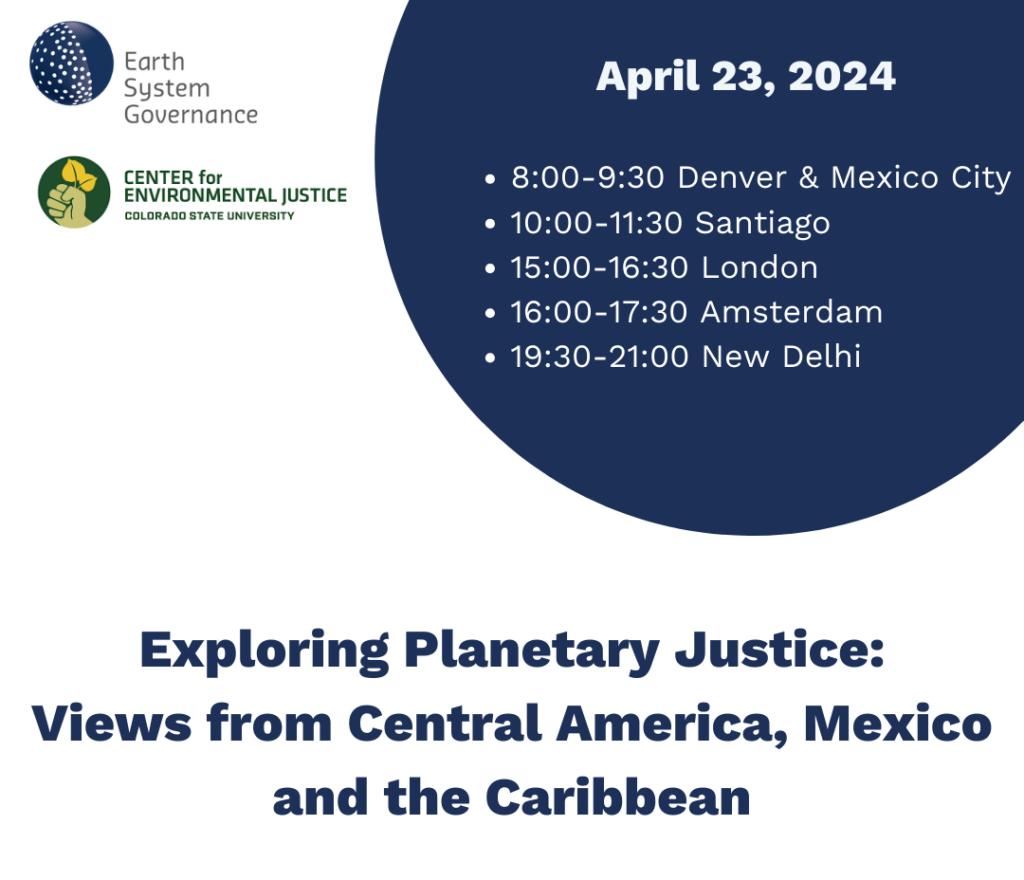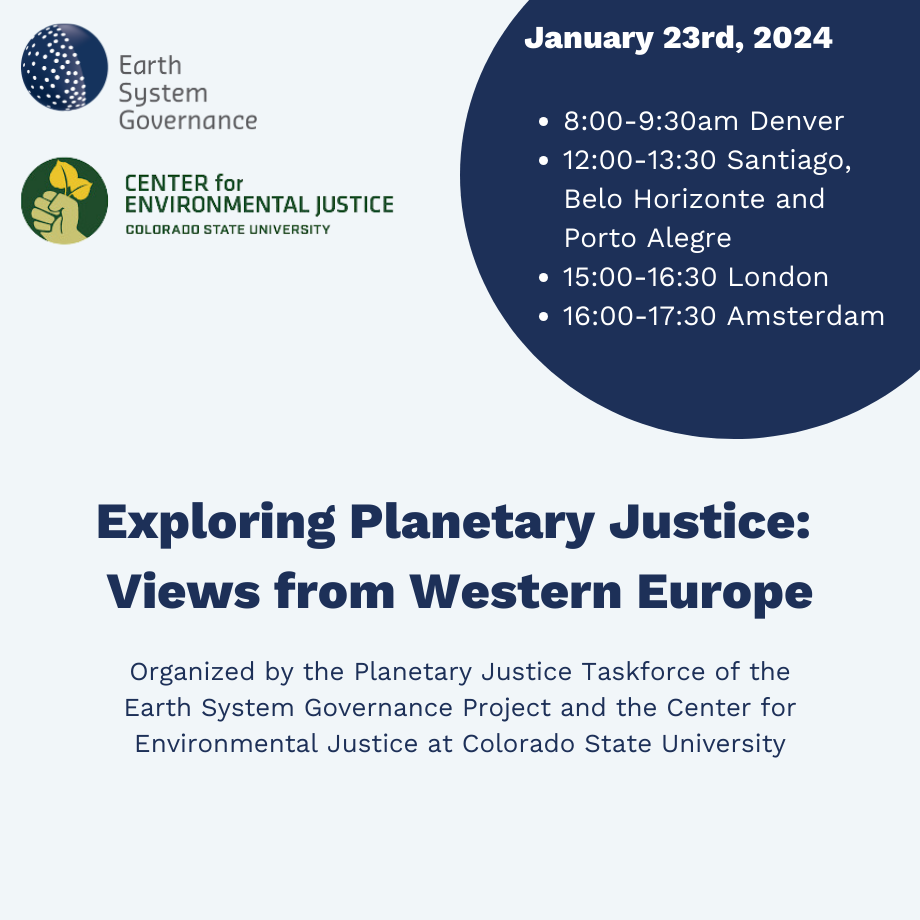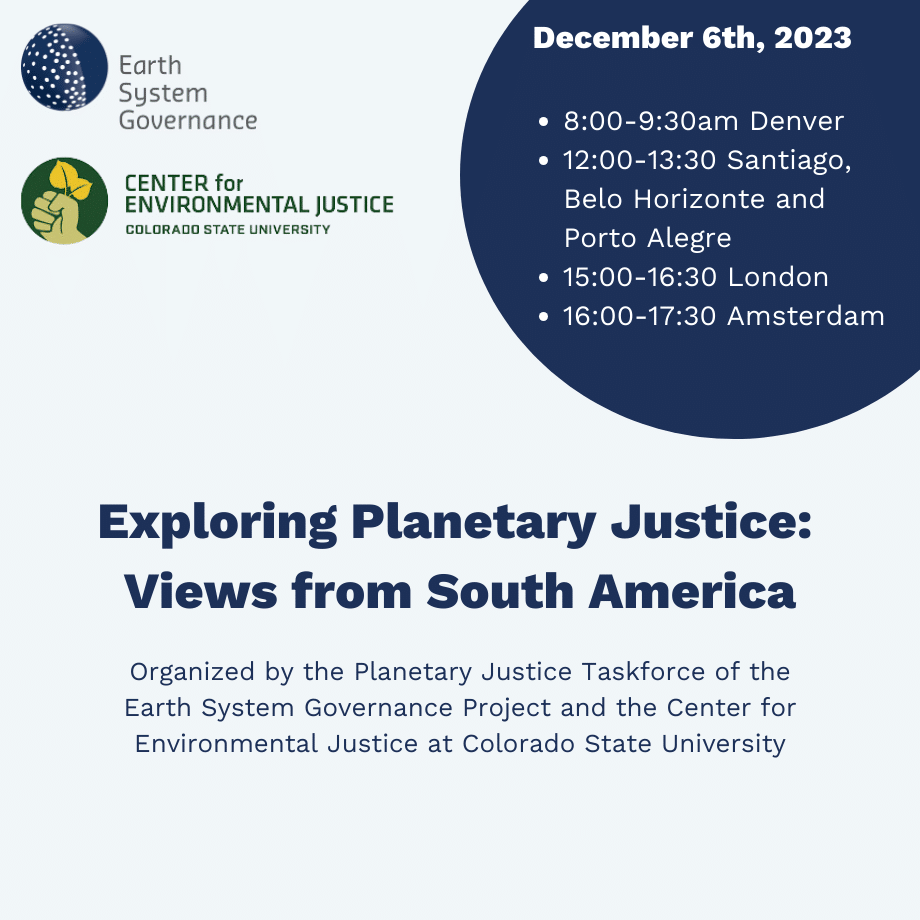On September 13th, an online webinar on climate governance, opportunities and challenges in Latin America will be held from 16:00 to 17:30 (CEST).
This webinar will include presentations by four experts from Latin America and provide an analysis of governance architectures related to climate change and insights based on case studies in Mexico, Central America, and Brazil. After the presentations, an open discussion and Q&A session will be held with online participants. Further details on the webinar can be found below.
Speakers and moderator
Judith Domínguez, professor-researcher at El Colegio de México’s Center for Demographic, Urban, and Environmental Studies, holds a Level III designation within the National System of CONACYT Researchers. With a PhD in Law from the Autonomous University of Madrid, her expertise encompasses politics, water law, water security, the human right to water, environmental governance, and climate change.
Active in various influential networks and councils, Judith Domínguez contributes as a member of the Technical Council for the CONACYT Thematic Network for water management and research. She also engages with the Latin America-European Union network of urban, territorial, and environmental studies at the Autonomous University of Madrid, the Water, Law, and Environment network (AGUDEMA) at the University of Zaragoza, and the Monitoring Group of the Water Sector of the Ministry of Environment and Natural Resources (SEMARNAT-Mexico). Additionally, she holds membership in the Mexican Bar-Colegio de Abogados.
She has published extensively, with over 50 specialized and dissemination works focused on environmental policy and management. Her recent works include “Legal Framework of Water: Towards a New Water Law” (Tirant Lo Blanch, 2022), “Sustainability, Technological Innovation, and Water Governance in Basins and Cities” (Tirant Lo Blanch, 2022), and “The Politics of Water through Its Institutions 1917-2017” (El Colegio de México).
Cintya Molina, professor-researcher, is associated with the Global Change and Sustainability Laboratory at the Instituto de Estudios Superiores “Rosario Castellanos.” Her research primarily centers around climate governance in Central America, the crucial role of institutions in Latin America’s decarbonization pathways, and economic water security in Mexico.
Previously, Cintya Molina held the position of associate researcher in the Energy Program at El Colegio de México. She also served as an assistant project member at the Water Security Observatory within the Center for Demographic, Urban, and Environmental Studies (CEDUA) at the same institution.
Her latest research focuses on decarbonization policy in Mexico and carbon dioxide removal in Central America.
She is also an ESG research fellow, and actively contributes to the Carbon Removal Working Group within the Earth System Governance Project.
Heloísa Tozato (University of São Paulo) is specialized in evidence-based public policy evaluation. Her work focuses on providing decision-making support in strategic areas related to climate change and biodiversity, particularly within the United Nations Conventions.
With a Ph.D. in Geography from Université de Rennes 2 – Haute Bretagne (Rennes, France) and a Doctorate in Environmental Sciences from the University of São Paulo (São Paulo, Brazil), Heloísa Tozato brings a diverse academic background to her research. She has also conducted postdoctoral research at the Joint Research Centre of the European Commission (Ispra, Italy).
Since 2017, she has been serving as a consultant for UNDP-Brazil, further extending her expertise in the field.
In addition to her academic and consulting roles, Heloísa Tozato actively engages in various research groups and networks. She is a valued member of the CLIMATE NETWORK’s Public Policy Sub-Network and contributes to the Public Policy, Territoriality, and Society Research Group at the Institute of Advanced Studies of the University of São Paulo, Brazil. Furthermore, she serves as a reviewer for esteemed scientific journals, including the Journal of the Court of Audit of the Union (TCU) and Confins (Paris).
Heloísa Tozato was awarded the 2016 Thesis Prize in the Environmental Science category from the University of São Paulo and received a “Très Honorable” mention from Université de Rennes 2 in 2015.
Lugui Sortibrán is the Director of Research and Postgraduate at Instituto de Estudios Superiores ‘Rosario Castellanos.’ Over the past four years, she has been involved in various projects aimed at strengthening the institute. She is a professor of the master’s degree program in Climate Change and Biodiversity and holds a PhD in Sustainability Sciences. She has actively participated in research projects, collaborating with national and international academic groups, focusing on topics such as the patterns of distribution and abundance of biodiversity, mechanisms of coexistence in plant communities, complex networks of biotic interactions, plant ecophysiology of arid zones, and the effects of Climate Change on biodiversity.
José María Valenzuela (Institute for Science, Innovation and Society (InSIS), University of Oxford) works on global and comparative studies on decarbonisation and the governance of technological change. He is a postdoctoral researcher at the Institute for Science, Innovation and Society (InSIS) working on carbon removal governance.
He is also an active member of the Oxford Scenarios Programme and the Oxford Martin Programme on Integrating Renewable Energy, and the Oxford Martin Programme on Post Carbon Transition. He has most recently conducted comparative research in Europe, China, and Latin American electricity markets and the role of experts in increasing regulatory capacity. He holds a DPhil in Public Policy from the Blavatnik School of Government, University of Oxford, and trained as an international politics scholar at El Colegio de Mexico, the University of Chicago, and Tsinghua University.
Between 2011 and 2017, he worked for Mexico’s Department of Energy and WWF Mexico on climate and renewable energy policy; and worked as a consultant to UNIDO, UNEP, and the US-National Renewable Energy Lab on institutional design for low carbon transitions in energy and industry.
Further details
The South-South Series: Opportunities and Challenges for Climate Governance in Latin America webinar emphasizes the need for effectiveness and efficiency in reducing emissions and adapting to climate change impacts in the region while exploring the significance of tailored approaches to climate action. Climate change impacts are not evenly distributed across the globe. Developing countries, due to their geographical location, economic situation, social conditions, and institutional structure, are more vulnerable to these impacts.
The United Nations Framework Convention on Climate Change (UNFCCC) recognizes this imperative and calls for developed countries to extend financial, technological, and capacity-building support to developing nations. This support facilitates their mitigation efforts against climate change impacts, as they become part of an international environmental regime specifically designed for this purpose.
Adjustments and reforms to the institutional framework are necessary to achieve the desired outcomes, holding global warming to 1.5°C above preindustrial levels. To address this issue, the webinar will focus on proactive actions and policy mechanisms that various Latin American nations implement in their commitment to combat climate change. The discussions will center around their role in multilevel climate governance, recognizing the opportunities, obstacles, and challenges encountered in advancing climate governance. It is crucial for practitioners and academics to stay informed about global developments by engaging in direct and inter-regional conversations.
The webinar will address key themes: amending legal frameworks, and access to funding, with a particular emphasis on cooperation, decision-making, and participation. These focal points ensure that efforts to mitigate the effects of global warming also contribute to goals for achieving sustainable development. The regional dialogue will shed light on these disparities, even among developing economies, thereby raising awareness and understanding.
Keywords
Developing Countries, Mitigation, Legal Framework, Cooperation, Climate Finance.








